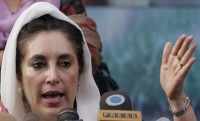An almost Indian tragedy

IDIOT BOX
Sevanti Ninan
The Zee News anchor asked Nawaz Sharif, "Sharif Saab, yeh kya ho raha hai
It has been such a grim year for Pakistan that as it drew to a close television anchors in India had more or less become accustomed to doing on-air marathons on events in that country, breaking news coverage going into several hours. What began with the confrontation between the executive and the judiciary in March would be repeated with the arrival and deportation of Nawaz Sharif, and the declaration of the Emergency.
But on Thursday night it was the biggest tragedy of them all, so the speculation (except for the Zee anchor) was devoid of the "it can’t happen here’ smugness that tinged Indian TV coverage of major events in
We had no access to how
And while every channel asked whoever they could whether elections could happen on schedule, only this reporter was able to instantly detail why in practical terms it was a total impossibility.
Off and on through the evening, the bleakness in the scenario there came through from the testimony of this one man. For the rest it was commentary and speculation and the never ending repetition on channels, particularly NDTV 24x7, of the footage of the blood-spattered ground with guns lying there. The last time we saw personality-driven assassination coverage to rival this was at the time of Princess Diana’s death in a car crash. A celebrity or politician with many archival photos and interviews to offer lends herself to coverage that seldom palls, particularly not on the night of the tragedy.
What Indian news channels do have to learn though is to occasionally take that Breaking News legend off the screen. When Benazir had been dead for three hours it made no sense to say ‘live’ and show her talking. Barkha Dutt, Arnab Goswami, and Prabhu Chawla among others were able to dredge up interviews done before. "Aapko dar nahi lagta," asked Chawla, referring to jail, not death, with that big grin which is his hallmark while asking questions, whatever their import.
What grew wearying was the Natwar Singh and Faroukh Abdullah interviews on a succession of channels. Has-beens can studio hop with alacrity, when given the opportunity.
Given how many times Indian journalists have met her, the coverage was only notionally that of a foreign leader. For both viewers and anchors the sheer familiarity of the person assassinated made it an almost Indian tragedy. Karan Thapar was able to score over others in anecdotal terms, because nobody else had quite been a long time personal friend.
In one sense Barkha Dutt’s was the most amazing performance of the evening because of the entirely solo act she pulled off over a longish period, without getting either hectoring or hysterical. There was repetition and the occasional foolish question from almost every anchor but overall nobody through the evening really made me cringe. And that’s saying a lot for a news event tailor- made for hysteria.
Not nobody—Star News stood guilty on one count: it actually had animated gun shots pepper pictures of Benazir on the TV screen, gun shots that then dribbled blood. Even proprietor Rupert Murdoch might have cringed at that.






